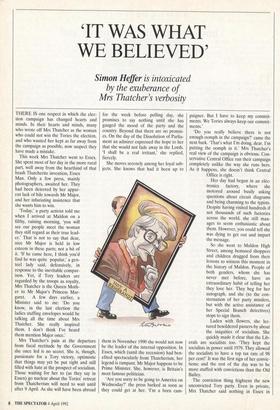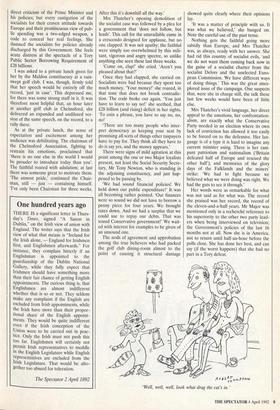`IT WAS WHAT WE BELIEVED'
Simon Heifer is intoxicated by the exuberance of Mrs Thatcher's verbosity
THERE IS one respect in which the elec- tion campaign has changed hearts and minds. In their hearts and minds, many who wrote off Mrs Thatcher as the woman who could not win the Tories the election, and who wanted her kept as far away from the campaign as possible, now suspect they have made a mistake.
This week Mrs Thatcher went to Essex. She spent most of her day in the more rural part, well away from the heartland of that brash Thatcherite invention, Essex Man. Only a few press, mainly photographers, awaited her. They had been deterred by her appar- ent lack of bile towards Mr Major, and her infuriating insistence that she wants him to win.
`Today,' a party activist told me when I arrived at Maldon on a filthy, raining morning, 'you will see our people meet the woman they still regard as their true lead- er.' That is not to say that dear, nice Mr Major is held in low esteem in these parts; not a bit of it. 'If he came here, I think you'd find he was quite popular,' a gen- teel lady said, defensively, in response to the inevitable compar- ison. Yet, if Tory leaders are regarded by the troops as royalty, Mrs Thatcher is the Queen Moth- er to Mr Major's Princess Mar- garet. A few days earlier, a Minister said to me: 'Do you know, in the last election the ladies stuffing envelopes would be talking all the time about Mrs Thatcher. She really inspired them. I don't think I've heard them mention Major once.'
Mrs Thatcher's pain at the departure from fiscal rectitude by the Government she once led is no secret. She is, though, passionate for a Tory victory, optimistic that things may yet be put right and still filled with hate at the prospect of socialism. Those waiting for her to (as they say in Essex) go nuclear about the Tories' retreat from Thatcherism will need to wait until after 9 April. As she will have been abroad for the week before polling day, she promises to say nothing until she has gauged the mood of the party and the country. Beyond that there are no promis- es. On the day of the Dissolution of Parlia- ment an admirer expressed the hope to her that she would not fade away in the Lords. 'I shall be a real irritant,' she replied, fiercely.
She moves serenely among her loyal sub- jects. She knows that had it been up to them in November 1990 she would not now be the leader of the internal opposition. In Essex, which (until the recession) had ben- efited spectacularly from Thatcherism, her legend is rampant. Mr Major happens to be Prime Minister. She, however, is Britain's most famous politician.
`Are you sorry to be going to America on Wednesday?' the press barked as soon as they could get at her. 'I'm a born cam- paigner. But I have to keep my commit- ments. We Tories always keep our commit- ments.'
`Do you really believe there is not enough oomph in the campaign?' came the next bark. 'That's what I'm doing, dear. I'm putting the oomph in it.' Mrs Thatcher's real view of the campaign is obvious. Con- servative Central Office run their campaign completely unlike the way she runs hers. As it happens, she doesn't think Central Office is right.
Her day had begun in an elec- tronics factory, where she motored around busily asking questions about circuit diagrams and being charming to the typists. Despite having visited hundreds if not thousands of such factories across the world, she still man- ages to seem enthusiastic about them. However, you could tell she was dying to get out and impart the message.
So she went to Maldon High Street, among bemused shoppers and children dragged from their lessons to witness this moment in the history of Maldon. People of both genders, whom she has never met before, have an extraordinary habit of telling her they love her. They beg for her autograph, and she (to the con- sternation of her party minders, but with the active assistance of her Special Branch detectives) stops to sign them.
Laden with flowers, she lec- tured bewildered passers-by about the iniquities of socialism. She quickly made it clear that the Lib- erals are socialists too. 'They kept the socialists in power until 1979. They allowed the socialists to have a top tax rate of 98 per cent!' It was the first sign of her convic- tions; and the rest of the day was to be more stuffed with convictions than the Old Bailey.
The conviction thing frightens the new unconvicted Tory party. Even in private, Mrs Thatcher said nothing in Essex in direct criticism of the Prime Minister and his policies; but every castigation of the socialists for their craven attitude towards Europe and their promiscuous view of pub- lic spending was a two-edged weapon, a code to conceal her real feelings. She damned the socialists for policies already discharged by this Government. She feels acute distress at the spectacle of a Tory Public Sector Borrowing Requirement of f28 billions.
I was asked to a private lunch given for her by the Maldon constituency at a rain- swept golf club. I was, though, firmly told that her speech would be entirely off the record, 'just in case'. This depressed me, for there was some strong stuff in it. It was therefore most helpful that, an hour later at another golf club in Chelmsford, she delivered an expanded and undiluted ver- sion of the same speech, on the record, to a rally there.
As at the private lunch, the sense of expectation and excitement among her audience was debilitating. The chairman of the Chelmsford Association, fighting to restrain his emotions, proclaimed that 'there is no one else in the world I would be prouder to introduce today than you'. The faithful roared with adulation; at last there was someone great to motivate them. 'The utmost pride,' continued the Chair- man, still — just — containing himself. 'I've only been Chairman for three weeks. After this it's downhill all the way.'
Mrs Thatcher's opening demolition of the socialist case was followed by a plea for a government that 'does not follow, but leads'. This call for the unavailable came in a crescendo designed for applause, but no one clapped. It was not apathy; the faithful were simply too overwhelmed by this mili- tant, vigorous and angry spectre, so unlike anything else seen these last three weeks.
'Come on, clap!' she cried. 'Aren't you pleased about that?'
Once they had clapped, she carried on. Socialists were bad because they spent too much money. 'Your money!' she roared, in that tone that does not brook contradic- tion. The code broke out again. 'You just have to learn to say no!' she seethed, that £28 billion (and rising) deficit in her sights. 'To coin a phrase, you have to say no, no, no!
'There are too many people who inter- pret democracy as keeping your seat by promising all sorts of things other taxpayers have to pay for. They think all they have to do is say yes, and the money appears.'
There were signs of mild agitation at this point among the one or two Major loyalists present, not least the Social Security Secre- tary, Mr Tony Newton, who is standing in the adjoining constituency, and just hap- pened to be passing by.
'We had sound financial policies! We held down our public expenditure!' It was all becoming rather pointed. 'Our finances were so sound we did not have to borrow a penny piece for four years. We brought taxes down. And we had a surplus that we could use to repay our debts. That was sound Conservative government!' We wait- ed with interest for examples to be given of an unsound one.
The nods of agreement and approbation among the true believers who had packed the golf club dining-room almost to the point of causing it structural damage showed quite clearly where their opinions lay.
'It was a matter of principle with us. It was what we believed,' she banged on. Note the careful use of the past tense.
Nothing gets the faithful going more rabidly than Europe, and Mrs Thatcher was, as always, ready with her answer. She had rid this country of socialist evils, 'and we do not want them coming back now in the guise of a socialist charter from the socialist Delors and the unelected Euro- pean Commission. We have different ways of doing things.' This was the great unex- plored issue of the campaign. One suspects that, were she in charge still, the talk these last few weeks would have been of little else.
Mrs Thatcher's vivid language, her direct appeal to the emotions, her confrontation- alism, are exactly what the Conservative Party needed in an election where its own lack of conviction has allowed it too easily to be forced on to the defensive. Her lan- guage is of a type it is hard to imagine any current minister using. There is her ram- pant patriotism and nationalism ('Britain defeated half of Europe and rescued the other half), and memories of the glory days of the Falklands and the miners' strike: 'We had to fight because we believed what we were doing was right. We had the guts to see it through.'
Her words were as remarkable for what was not said as for what was. The record she praised was her record, the record of the eleven-and-a-half years. Mr Major was mentioned only in a recherché reference to his superiority to the other two party lead- ers when being interviewed on television; the Government's policies of the last 16 months not at all. Now she is in America, not to return until half-an-hour before the polls close. She has done her best, and can say (if the worst happens) that she had no part in a Tory defeat.
'Well, well, well, look what drag the cat's in.'



























































 Previous page
Previous page